- Home
- Georgette Heyer
Instead of the Thorn Page 6
Instead of the Thorn Read online
Page 6
If Elizabeth were old-fashioned, then how well she would blend with the flowers of his garden. She belonged to the age of Sweet-Williams and London Pride; he pictured her, a maid of long ago, demurely gowned, with a tiny posy of flowers in her hands. Cynthia said that she harked from Mid-Victorian times, but Cynthia was wrong. The Elizabeth round whom he built his whimsical fancies belonged to no age, but was symbolic of the eternal dream woman. Least of all could she be typical of an age that was ugly, and saw indecencies everywhere, even in piano legs.
Cynthia could not shatter his rosy dream, hard though she might try. Cynthia said, For God’s sake, come out of the mists! and wondered what had happened to him. She told him that he was cheating himself, that the Elizabeth he was in love with was an Elizabeth of his imagination and not the true one. He thought her jealous, even feline, and his beliefs remained unshaken. He coaxed his mother to call on Miss Arden and eagerly awaited her verdict.
“Such an alarming woman!” she said, smiling sweetly up at him. “Of course I said all the wrong things, Stephen. Wasn’t it dreadful of me?” His mother might be vague and aimless, incapable of any reasonable thought, but she was his mother and he adored her. Now he laughed, and kissed her hand.
“You always do, mater, so what’s the odds? You wouldn’t be you if you didn’t.”
“No, I suppose I shouldn’t,” she agreed. “Do you like me as I am, darling?”
“Yes. Who was the alarming woman?”
“Oh, not Elizabeth, Stephen! Miss Arden. Her skirt dipped at the back and she said you were a charming young man.”
“Well, that ought to have pleased you,” he pointed out.
“No, darling, not at all. No one but myself ought to know that you’re charming. Where was I?”
“You said Miss Arden alarmed you.”
Mrs. Ramsay put down her tea-cup.
“Did I? No, she didn’t exactly alarm me, except that she was so correct. I don’t really know the word I want.”
“Never mind about Miss Arden. Did you see Elizabeth?”
“Yes, she poured out the tea, and she didn’t forget that I don’t like mine strong. Quite a dear girl. She reminds me of someone, only I can’t remember who. Someone who lived at some place beginning with a B, I think. You must know, Stephen. No, I’ve got it. Marion Tapley; she died before you were born, poor thing. Yes, and she lived at Weybridge, and I remember thinking at the time that she just suited the place. She had an impediment in her speech.”
“Hang it all, mater, Elizabeth hasn’t got an impediment—”
“What a horrible idea, darling! I shouldn’t have liked her at all if she had. As a matter of fact she has a very pretty voice. Such an asset! Do you remember Kate Dalkeith? Poor dear, she was almost ugly, but what a beautiful voice!”
“Yes, mater, but we’re not talking about Kate Dalkeith.”
She smiled happily across at him.
“Nor we are. I’ve lost myself again. Oh, yes, about Elizabeth! Very young, Stephen.”
“Nearly twenty, mater.”
“Well, darling, that is very young. I don’t know how old you are—at least, of course, I do, but I’ve forgotten for the moment.”
“Twenty-seven.”
“Dear me, Stephen, what a dreadful thought! Why, Cynthia must be twenty-five.”
“She is. You gave her that diamond brooch on her birthday.”
“So I did.” Mrs. Ramsay nodded pensively. “With an emerald in the middle.”
Stephen brought his cup to her to be replenished. Her small white hands fluttered over the tea-tray, from milk-jug to sugar bowl.
“You don’t really like Elizabeth, mater?”
“Yes, I do, Stephen. Why not?”
“You don’t give me the impression—”
“My dear, do I ever give people a right impression? Elizabeth seemed to me a very sweet child. But isn’t she rather a throw-back? Or do I mean a missing-link?”
“Good lord, I hope not! You mean that she’s old-fashioned?”
“So prim,” she explained.
There fell a tiny pause.
“That’s rather a beastly word, mater.”
Mrs. Ramsay put down the slice of bread and butter she had so carefully folded in half.
“I’m sure it isn’t. What have I said that was awful?”
“Prim.”
“Oh, that! It’s not awful at all, Stephen. I thought I’d said something I shouldn’t from your expression.”
“So you did. Elizabeth could never be prim.”
“Couldn’t she, darling? I expect you know her a lot better than I do.”
This was unsatisfactory. Stephen glowered into the fire.
“You’ve allowed Cynthia to influence your judgment, mater.”
“Dear Cynny! So domineering. No, I don’t mean domineering. Downright. That’s better.”
“What did she say about Elizabeth?”
“I can’t remember that she said anything. Oh yes, she did! She said Elizabeth hadn’t got a mind of her own! That’s rather true, Stephen.”
“It’s not. She’s shy and reserved.”
“I expect it’s the aunt,” Mrs. Ramsay said placably. “She won’t let Elizabeth have a mind of her own; she wants her to have her mind. Stephen, that’s rather clever. Now I know where you get your brains from.”
He laughed, but reluctantly and like a sulky boy.
“Because Elizabeth doesn’t smoke and doesn’t always say exactly what she thinks, whether it’s rude or not, Cynthia condemns her. That’s just like Cynthia. Beastly intolerance.”
“Yes, but we Ramsays are always dreadfully outspoken, dear.”
“What’s that got to do with it?”
“Lots. You see, Stephen, you’ve always been used to terribly frank people, and you’re the same yourself.”
He rose and went to the fire, one hand on the mantelpiece and the other deep in his trouser-pocket. He spoke, looking down into the fire, and not at his mother.
“What are you driving at, mater?”
“Only that you’ve never been interested in a girl as you’re interested in Elizabeth, dear hoy.”
“No.” He began to play with one of the china ornaments near his hand.
“And you sent me to see what I thought of her. Didn’t you?”
“I suppose— Yes. You know, this is rather—”
“Dreadfully. Well, I like Elizabeth, but I don’t know why I’d like her if I had to.”
He raised his head, and Mrs. Ramsay saw that his eyes were crinkling at the corners. That hinted smile was reflected on her lips at once.
“Wouldn’t you feel the same about any girl, mater?”
“Yes, I expect I should. Of course, darling, you’ll do as you please, and I shall be nice about it— Don’t you think I should be a charming mother-in-law?—only don’t rush into anything with your eyes shut. That would hurt me terribly.”
“I’m not a bit likely to do that, mater.”
“Yes, you are, Stephen. You’re so like your father.”
The smile grew.
“Well, if he rushed into marriage with you with his eyes shut I can’t do better than to follow his example and shut my eyes.”
“My dear, what a beautiful compliment! But Elizabeth isn’t like me, you know.”
He looked wistfully down at her.
“I thought you’d get on with her so well, mater. She is like you in some ways—at least, I think so.”
Mrs. Ramsay went to him and put her hand up to stroke his cheek.
“Poor boy! I expect I shall get on with her splendidly when I see her away from her aunt. Anyway, don’t let’s worry! Only I do so wish it had been Nina Trelawney.”
He moved one shoulder impatiently, and the vase he had played with, fell into the hearth and was smashed.
“Damn. There was never any chance of that, mater. Sorry about the vase. Was it valuable?”
“No, not a bit, I hated it. Break its twin.”
He obeyed, abs
ent-mindedly. Mrs. Ramsay watched the work of destruction with great interest. Then Stephen began to laugh.
“Mater, how mad!”
“Yes, but doesn’t china make a fascinating sound when it smashes? Can’t we break anything else?”
“No, not to-day. Come down to Queen’s Halt next week and we’ll break those awful china dogs Cousin Freda sent us.”
“What a splendid idea, Stephen! We might break the Crown Derby plates too.”
“No, we can’t do that,” he objected. “Not Crown Derby. I don’t think I could.”
“Think how blatant they are, Stephen. I’m sure I could.”
“I know. Still . . . They’re too good to break.”
“That makes it all the more exciting. We’d feel so wicked,” she said, dimpling. The dimples disappeared. “Elizabeth wouldn’t understand about smashing china, darling, would she?”
Chapter Seven
It was inconceivable that you could like a man and not his nearest relations. Excuses had to be found for Mrs. Ramsay and were quickly forthcoming. She was eccentric; it was deplorable, but an excuse; she was absent-minded: a fault, but one that made her the more attractive. Lawrence located her in Debrett; she came of ancient stock, and not only had she married into the County, but she was herself County. Lawrence realized to the full the significance of this magic word; it was better in these days to be County than Titled. Mrs. Ramsay’s eccentricity pointed to no lack of breeding, but rather to her nobility. Miss Arden said that it was refreshing to meet anyone so delightfully unconventional.
In an introspective mood Elizabeth knew herself to be drifting towards an alien pool. There was no mistaking Stephen’s ardour; it was obvious to all, so obvious that sly jokes were cut by Lawrence and Aunt Anne at her expense. About Stephen there could be nothing alien, but in the world where he dwelt was Cynthia, incomprehensible in her speech and manners, and Mrs. Ramsay, incomprehensible too, and from Elizabeth, poles apart.
Elizabeth felt it dimly, then thought herself morbid in her imaginings. She was bred in an atmosphere of class-distinction; she knew that in Miss Arden’s eyes she stood upon the brink of a successful marriage. She had thought about it many times, seeing herself the wife of a famous novelist, hearing herself referred to as County. It was snobbery, she knew, and scolded herself for indulging the vice, but the secret thrill remained, dominating her judgment.
In Miss Arden’s attitude towards her was a new tenderness; did she forget some trifling behest or errand, Miss Arden would smile mysteriously and say, We’re very forgetful nowadays, aren’t we? with no annoyance, hut an evident satisfaction.
“I am in love,” Elizabeth thought. “I must be in love.”
But how difficult it was to distinguish between love and like! If love meant pleasure felt in Stephen’s company, and pride in his appearance, she loved. If it meant that she would be sorry never again to see Stephen, then surely she loved. Other girls spoke of heartaches, of longing and despair, but how often had she proved that other girls were different? Violent emotions bordered on indecency; the nearest approach to violence that she had achieved was an inward shudder of pure delight when Stephen was masterfully gentle, possessive.
She saw herself fragile and precious in his eyes, and was glad. His tall proportions and his strength pleased her, and she loved to be asked:—
“Who is that awfully good-looking man you danced with the other night?”
She seemed to herself to grow in stature when she answered that it was a great friend, Stephen Ramsay, the novelist. How immeasurably proud she would be if ever she could say: It is my husband.
“Are you in love with Stephen?” Sarah asked her.
It was the first direct allusion; Lawrence and Aunt Anne dealt in innuendoes. Elizabeth blushed deeply and was embarrassed.
“Sarah!”
“Anyway it’s as plain as a pike-staff that he’s head over ears in love with you. Any amount of girls have run after him, but I’ve never seen him so absolutely struck before.”
This was immensely satisfying; Elizabeth’s eyelids drooped, and she smiled.
“You’re damn’ lucky,” said Sarah candidly. “There aren’t many Stephens in this world.”
Elizabeth thought of the scores of men whom she had met, and with whom she had danced.
“No, there aren’t,” she agreed, wondering how it was that she had never thought of this before.
Sarah looked at her curiously.
“Are you in love with him? You needn’t mind telling me.”
“Sarah—you do—ask awful questions!” Elizabeth said. “I—don’t think I know. I like him ever so much—as a friend.”
“Personally,” said Sarah, lighting a fresh cigarette from the stump of her old one, “I should imagine he’d make rather a jolly husband. Bit temperamental perhaps, and fairly selfish, but—can’t think of the word I want—understanding and—considerate.”
“If he’s selfish—but I’m sure he isn’t, Sarah—how can he be considerate?”
“Selfish in the small everyday things of life, like insisting on going to Scotland when you’d set your heart on France, and considerate in the—the bigger things. Have you got what I’m driving at?”
Elizabeth knew from the constrained note in Sarah’s voice that she was talking of something in marriage that was dark and mysterious. Suddenly she longed for the courage to confess ignorance and beg enlightenment. But years of training stood in her way, and the implanted belief that knowledge was wrong.
“Oh, yes!” she said vaguely.
“Taking it all in all,” Sarah went on reflectively, “he might be a lot worse. He wouldn’t do for me, and I shouldn’t have said that he’d do for you either. Still . . . S’pose I’ll be congratulating you ere long?”
“Oh, do be quiet!” begged Elizabeth, rosy-cheeked.
Sarah rose to go.
“Well, I think you’re jolly lucky,” she remarked.
Everybody seemed to think that, although no one was so outspoken as Sarah. Lawrence cast up his eyes comically when Stephen’s impetuous knock sounded on the front-door, and murmured,
“Oh, Elizabeth, Elizabeth! I suppose I shall be de trop now?”
And Miss Arden smiled as at a hidden thought, and gave Elizabeth’s hand a little squeeze.
She was a heroine of romance all at once, and all things were forgiven her on the score that she was in love. She had never before felt so important, nor taken so prominent and conspicuous a place in the opinions of her relatives. It was embarrassing sometimes, but always delightful.
And how much more important she would be if she married Stephen and became mistress of a house of her own. Aunt Anne would have to admit then that she was really and truly grown-up, and no one would be able to say, Elizabeth, go and tidy your room, as though she were still only a little girl. More than that: once she was married she could do anything she liked without reproach, all the little things that a girl could not do. She would always have a partner at hand, and she would be able to give parties of her own without having first to ask permission.
She saw herself ordering her own groceries, and superintending her own maids. That would be fun. She would pour Stephen’s coffee out at breakfast, and say all the proper wifely things to him. And he would talk to her about his new book; perhaps, even, he would read passages to her and ask her advice.
Then the tiny fear sprang up again, How shall I hold my own with his mother and .his sister? I am not of his world. The fear was hateful, and grew larger as she dwelt upon it. She brushed it aside then, thinking, I am not marrying them; it will not matter. She gave herself up to romantic imaginings, and presently saw herself, married to Stephen, a transformed being, no longer shy, no longer tongue-tied or ignorant, but the woman she longed to be and would never be.
She began to count the days that had passed since she had met Stephen. It was three months, only that, a very little time in which to learn to know a man. She wondered whether she did know Stephen, and whether a
ny girl knew her man before she was irrevocably tied to him. By devious paths she approached Miss Arden with this question, saying nervously at last.
“I suppose—Auntie—marriage is always—rather a— plunge in the dark?”
“Nonsense, child!” Miss Arden said briskly. “What on earth do you mean?”
“Only that—it’s difficult to know—can one possibly know—what a man is really like—before one marries him? I mean—one doesn’t know anyone—properly—till one has lived in the same house with them. And—and wouldn’t it be—rather dreadful—if after all—it turned out that one had made a mistake?”
“My dear Elizabeth, you’re getting morbid,” Miss Arden said flatly. “You’ve been mooning about indoors too much, and reading silly books.”
Elizabeth’s fingers gripped together till the knuckles shone white.
“Aunt Anne—I don’t believe I know—quite what—it will mean.”
Miss Arden knitted faster than ever, and did not look at Elizabeth.
“The best thing you can do, my dear, is to go for a brisk walk in the Park,” she said repressively. “You don’t know what you’re talking about.”
Elizabeth got up, and stood for a moment looking down at Miss Arden.
“Oughtn’t I to know?” she said quietly.
“My dear Elizabeth, you can take it from me that if you love your husband all these silly fancies of yours are groundless. Now run along and put your hat on.”
Elizabeth went slowly out of the room. For the first time in her life a great regret took possession of her, and a great want.
“I wish my mother hadn’t died.”

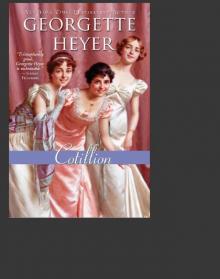 Cotillion
Cotillion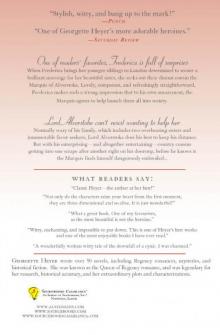 Frederica
Frederica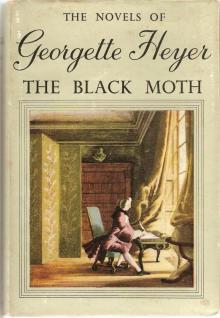 The Black Moth: A Romance of the XVIIIth Century
The Black Moth: A Romance of the XVIIIth Century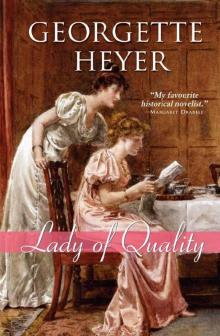 Lady of Quality
Lady of Quality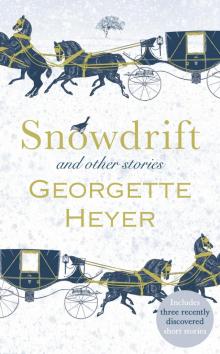 Snowdrift and Other Stories
Snowdrift and Other Stories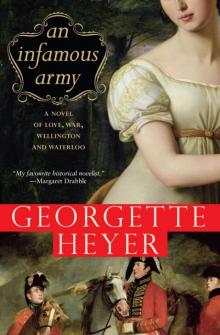 An Infamous Army
An Infamous Army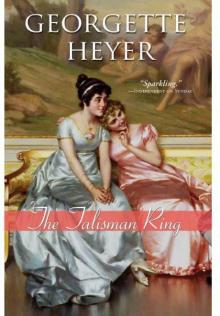 The Talisman Ring
The Talisman Ring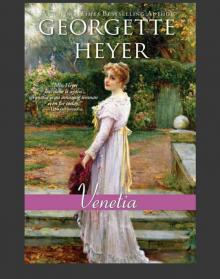 Venetia
Venetia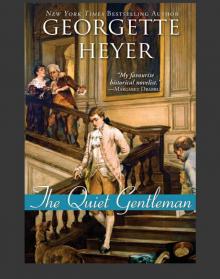 The Quiet Gentleman
The Quiet Gentleman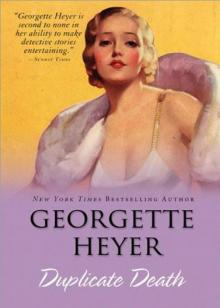 Duplicate Death
Duplicate Death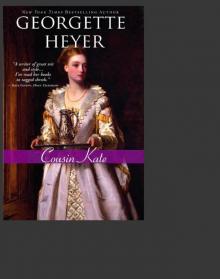 Cousin Kate
Cousin Kate Black Sheep
Black Sheep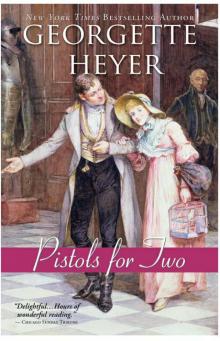 Pistols for Two
Pistols for Two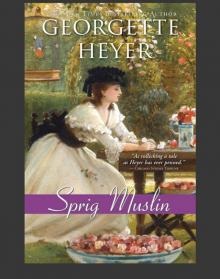 Sprig Muslin
Sprig Muslin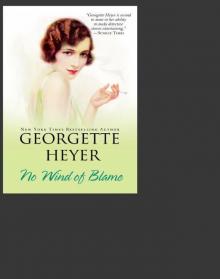 No Wind of Blame
No Wind of Blame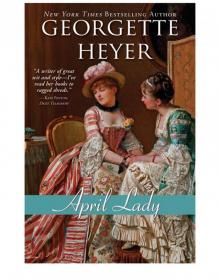 April Lady
April Lady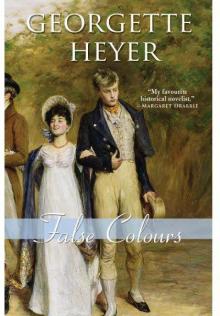 False Colours
False Colours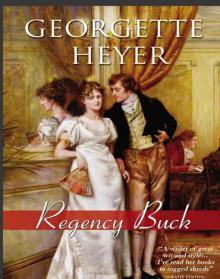 Regency Buck
Regency Buck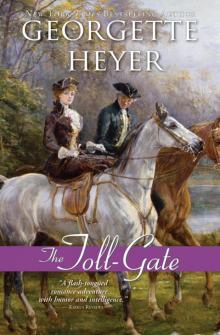 The Toll-Gate
The Toll-Gate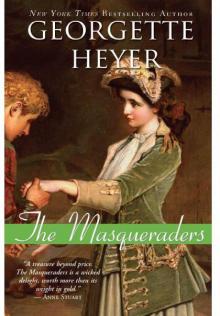 The Masqueraders
The Masqueraders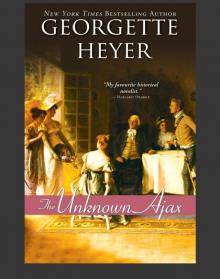 The Unknown Ajax
The Unknown Ajax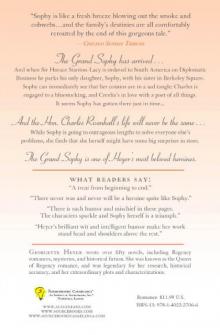 The Grand Sophy
The Grand Sophy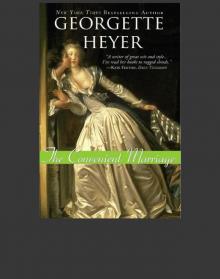 The Convenient Marriage
The Convenient Marriage Faro's Daughter
Faro's Daughter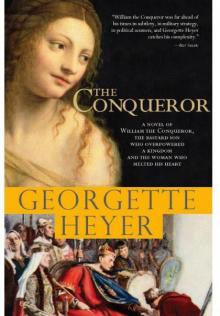 The Conqueror
The Conqueror The Foundling
The Foundling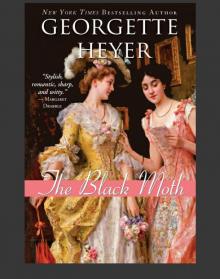 The Black Moth
The Black Moth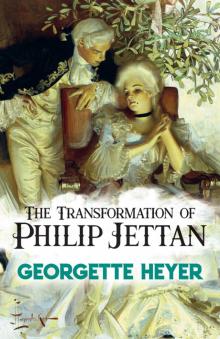 The Transformation of Philip Jettan
The Transformation of Philip Jettan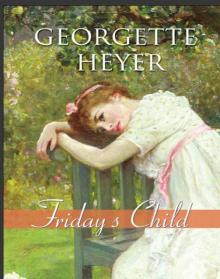 Friday's Child
Friday's Child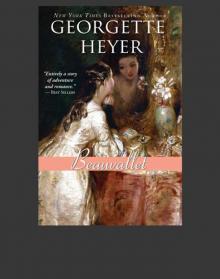 Beauvallet
Beauvallet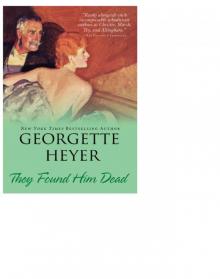 They Found Him Dead
They Found Him Dead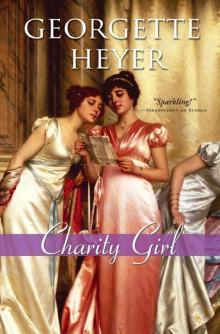 Charity Girl
Charity Girl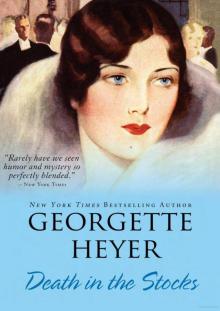 Death in the Stocks: Merely Murder
Death in the Stocks: Merely Murder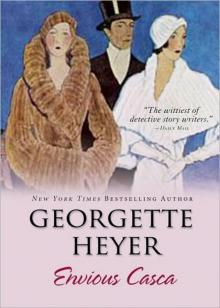 Envious Casca
Envious Casca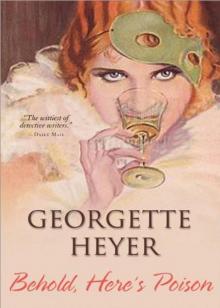 Behold, Here's Poison
Behold, Here's Poison Arabella
Arabella The Nonesuch
The Nonesuch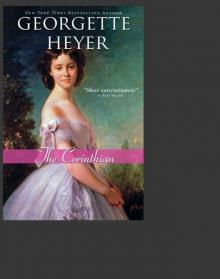 The Corinthian
The Corinthian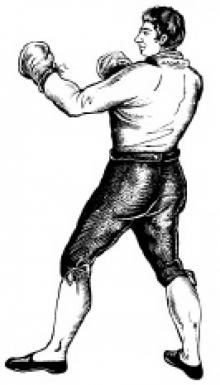 Jennifer Kloester
Jennifer Kloester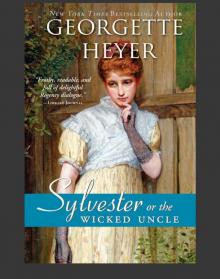 Sylvester
Sylvester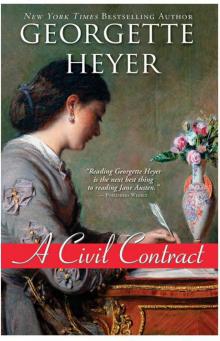 A Civil Contract
A Civil Contract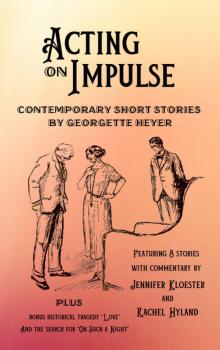 Acting on Impulse
Acting on Impulse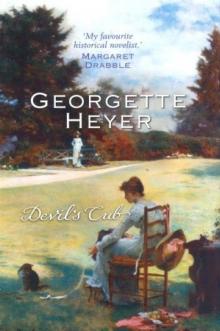 Devil’s Cub at-2
Devil’s Cub at-2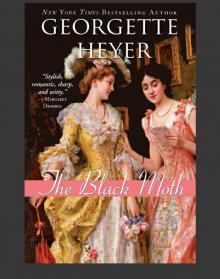 Black Moth
Black Moth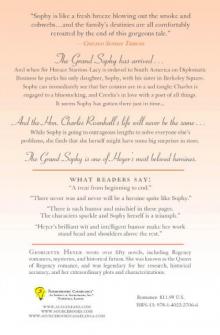 Grand Sophy
Grand Sophy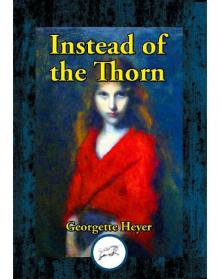 Instead of the Thorn
Instead of the Thorn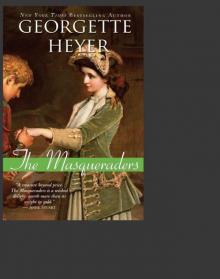 Masqueraders
Masqueraders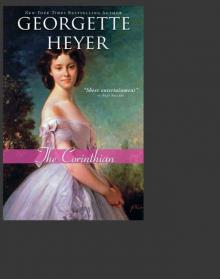 Corinthian
Corinthian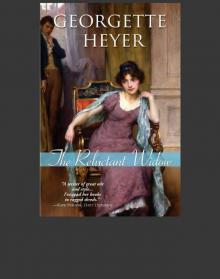 Reluctant Widow
Reluctant Widow